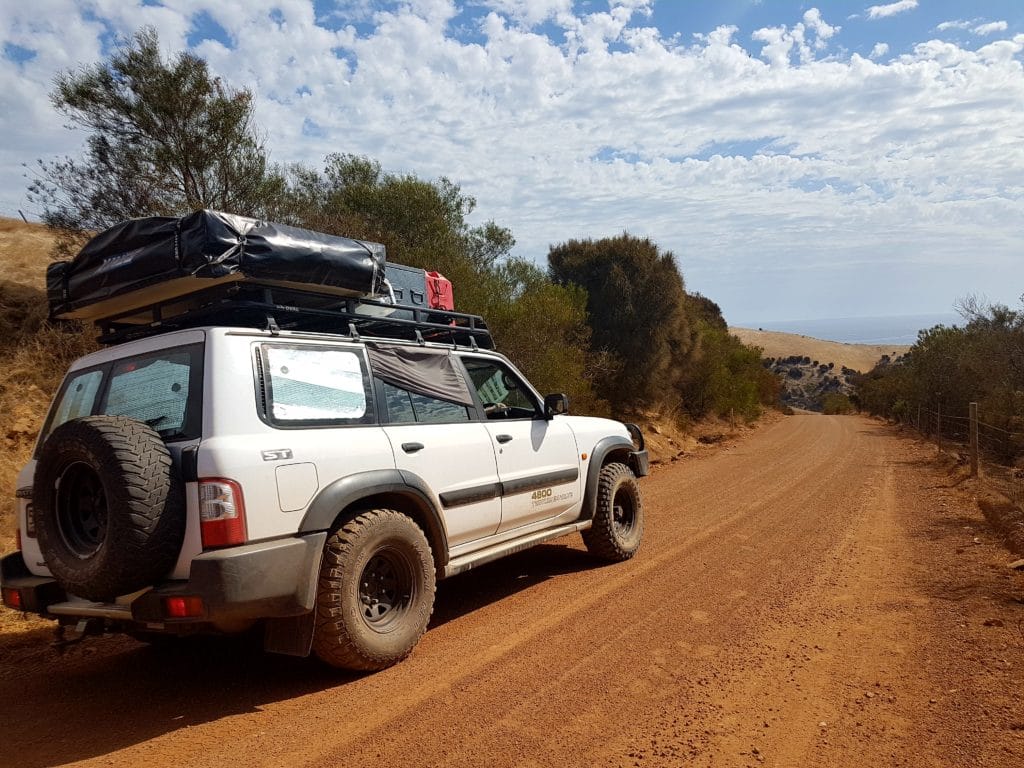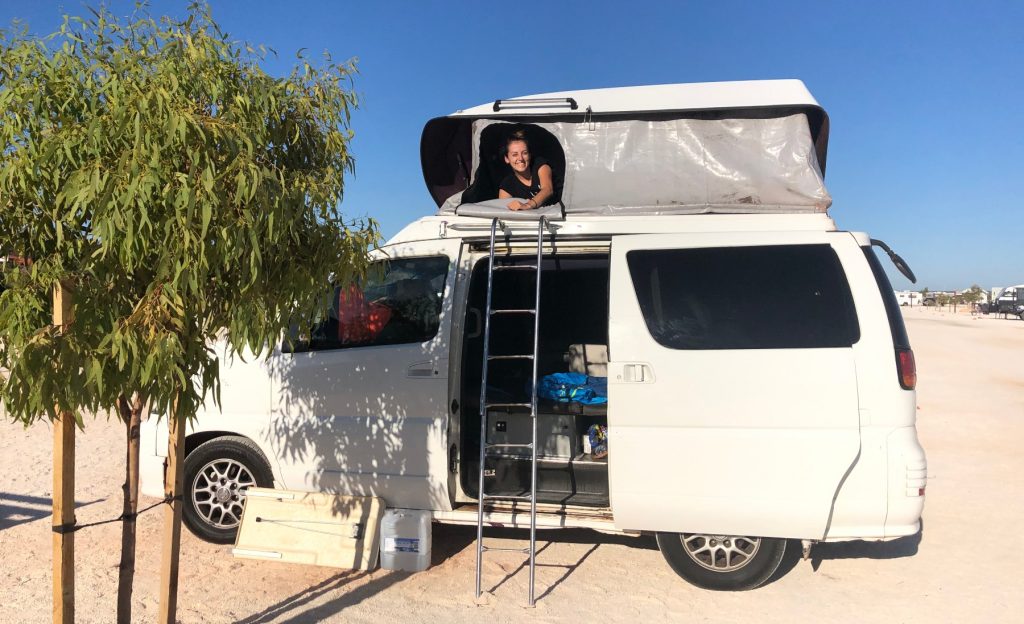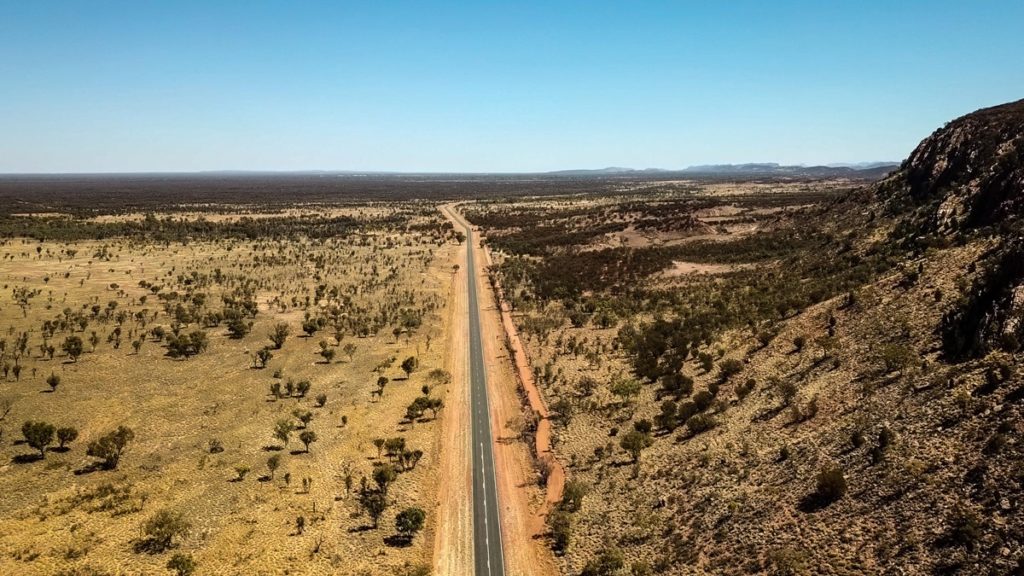The reputation of an Australian road trip leaves people dreaming of expansive red landscapes, sweeping hills and tropical coastlines. The ultimate way to make the most of Australia’s diverse landscapes and to discover the wilderness is travel by car or campervan. Deciding to buy a car, campervan, 4WD or motorhome in Australia can save you hundreds of dollars on long-term travel—provided you know what to look for, when to buy and how to avoid hidden costs. This step-by-step guide brings you right up to date with 2025 prices, official links and pro tips to help backpackers and road-trippers make the smartest purchase.
Table of Contents
Buying a vehicle in Australia: Pros & Cons
Buy vs. Rent: Which Makes Sense?
If you’re in Australia for under three months, renting often costs less than the purchase, insurance and registration of a vehicle. Daily campervan hires start at A$70–90 off-peak, rising to A$120+ during summer.
For stays longer than 3 /4 months, buying usually wins on value—especially if you plan two or more road trips. You’ll recoup up to 70–80 % of your purchase price on resale, making a one-time investment more economical than repeated rentals.
Advantages of buying
- More cost-effective for a long trip (from 3 months).
- Maximum freedom: to go where you want, when you want
- Impression of having a home, you own it, you can do what you want to it.
- No time or destination constraints
- Possibility of soliciting employers and being accommodated on site.
Disadvantages
- Get an older vehicle with higher mileage
- No assistance included (unless you buy one)
- Resale can take time depending on time and location.
- Research is longer at the time of purchase, and the sale time can also be long.
Read also : Life in a van in Australia

Choosing a vehicle to travel around Australia
Here are some criteria to take into account, they will help you see more clearly in your search:
- The type of road trip you plan to do and the regions you want to explore,
- its duration,
- your need in terms of comfort,
- your budget.
A 4WD (Four-wheel-drive)

A 4WD is suitable if you plan to go off track and engage in the outback, in the sand (on the beach for example, especially at Fraser Island) or take on water crossings.
Some national parks are accessible only by 4WD, particularly in the north of Western Australia and the Northern Territory. The most famous sites in these states are the Kimberley, Kakadu National Park (part of it is accessible with a conventional vehicle), Bungle Bungles and Karijini National Park.
To sum up, buy a 4X4 vehicle if you crave adventure and want to discover remote areas or difficult to access places.
However, buying a 4WD vehicle is an expensive option. The price can range from anywhere between $9,000AUD – $15,000AUD. Add the Annual Rego & CTP cost (around $1000). Also consider calculating in your budget fuel consumption. Four-wheel-drive vehicles offer comfortable interior room but, can become tight if you are travelling with more than 2-3 people.
You can choose to buy a 4WD vehicle that is already equipped or not. It is quite common to find travellers with a fully furnished 4WD for sale (a bed or a rooftop tent). It should also include all necessary equipment for cooking and camping. Otherwise you can choose to buy a 4WD unequipped (cheaper) to benefit from more seats or you want to design and do the interior fit out yourself.
The most common models are: Mitsubishi Pajero, Toyota Landcruiser, Nissan Pathfinder, Ford Explorer, Nissan Terrano, Nissan Patrol, Holden Jackaroo, Jeep Cherokee.
Buy a Compact Car

A car is a good way to travel economically and is the cheapest vehicle to buy. The disadvantage is especially space. Depending on the model of car but, you might have to count on sleeping in a tent rather than inside the vehicle.
However, this is a great option for socialising and making travel buddies, which in turn will save you money if you end up car-pooling. A car will also be suitable for backpackers who are currently working and are opting for the occasional road trip and relatively short trips, to go from one city to another for example.
The most common models are: Ford Falcon, Holden, Mitsubishi Lancer, Toyota Camry, Subaru Outback / Liberty. Station wagons are quite popular for backpackers and are highly prized as they offer more space and provide space in the rear for a bed. Cars will definitely be the cheaper option if your budget is limited. Typical Purchase Price between $4 000 – 8 000 + Annual Rego & CTP ($600–800).
Buy a campervan
Campervans are a classic for road trips in Australia! It will allow you to adopt a lifestyle that is more comfortable by the space it offers and will be better suited to long journeys / stays.
Expect between AUD8,000 and AUD10,000 for the purchase, depending on the equipment, vehicle age and the number of kilometres. Add the Annual Rego & CTP ($700–900 per year).
Owning a campervan is less convenient for socializing and car-pooling with other travellers on the road as vans are often equipped for 2 sometimes 3 passengers. Vans would benefit those traveling as a couple. The van is also a big advantage to look for jobs in agriculture (farm work, fruit picking) as some employers will require you to have your own house or “own accommodation.”
There are different types of vans, such as “classic” vans: the small van, “poptop” vans where the roof is raised by hand to allow for more room, the “Hitop” which has a permanent raised roof allowing the option to have a second bed in the upper part of the vehicle, or 4×4 vans (which are a good compromise) which allow you to take the tracks more easily.
The most common models among backpackers are: Toyota Hiace, Mitsubishi Express, Mazda E2000, Ford Econovan, Toyota Townace, Nissan Urvan.

Pre-Purchase Inspection & Paperwork
Mechanical
Start with general external conditions of the vehicle: are there traces of rust? Paint spots that could disguise the fact that the vehicle has had an accident? Look at the condition of the tyres, the engine (if there is residue built up, traces of leaks around it). You can arrange for a Mechanical Inspection. Hire a qualified mechanic to conduct a comprehensive check if the seller can’t supply a recent Roadworthy Certificate (RWC).
Also pay attention to the inside of the vehicle: find out about the electrical system. Ask if the vehicle has one or two batteries and make sure you ask the current owner to show and explain how it all works.
Your contact with the seller is an essential criteria. Chances are you can sense whether the person is trustworthy or not, so don’t hesitate to start the conversation. Ask about previous repairs, mechanical history of the vehicle (with supporting invoices), etc.
Test drive
We advise you to test drive the vehicle before purchasing. Avoid at all costs buying a vehicle that you have not been able to test drive. Drive it, even if it’s not long, it will allow you to note if an unusual noise is heard, to try the brakes, the clutch, to see the handling and if you are comfortable with driving that vehicle (especially for vans).
Registration & Insurance
All vehicles are required to be registered in a state of Australia. It is necessary to check whether the vehicle has a valid registration.
Know that each state has different regulations. This is an extremely important point, because some states require a roadworthy certificate inspection every year and before the resale of vehicles.
If the rego is still valid and it comes from a state requiring a roadworthy certificate, you’ll know that your vehicle was deemed “safe” there in the last year. If it is not valid, do not forget that it is required, and you should budget for it. So, plan for any repairs that are required as a result of the roadworthy inspection.
When you buy:
- Transfer Rego: Each state has different transfer windows (e.g. VIC & NSW: 14 days post-sale; QLD: 30 days). Expect to pay A$300–500 in transfer fees plus stamp duty.
- Compulsory Third-Party (CTP) is included in your rego. It covers injuries to others but not damage to vehicles—upgrade with Comprehensive Cover to reduce your excess to A$0–500 per claim.
Also remember to check (before the purchase) if the seller has no fines to pay by going to the Government website: https://transact.ppsr.gov.au/ppsr/Home, you don’t want to have the bad surprise to have to pay in his place…
Read also : Registration in Australia: Complete Guide

Essential Digital Tools & Contacts
- PPSR Check: https://transact.ppsr.gov.au/ppsr/Home
- RWC Testing (VIC): https://transport.vic.gov.au/registration/roadworthy-certification Transport Victoria
- Vehicle History & Reviews: CarVertical, AutoCheck.
Where & When to Buy
Where should you buy your van in Australia?
Best Cities: Sydney and Melbourne → largest stock of sellers, competitive pricing. Christchurch-style hubs in Adelaide and Cairns sometimes net bargains off-peak.
Platforms: Carsales, Drive, Gumtree, Facebook Marketplace and BackpackerCars (customized vans with one-year roadside assistance using code BACKPACKERS).
🚗 GREAT DEAL : Your customized vehicle available as soon as you arrive in Australia !
If you’re planning to go on a Road Trip as soon as you arrive in Australia, the best option is to go through backpackercars.com. They offer all types of vehicles for sale (cars, vans, and 4x4s) and customize them according to your needs. The advantage is that all mechanics are checked, the paperwork is in order, and you can leave with it as soon as you arrive in Australia.
📍 Vehicles available in Sydney, Melbourne, and Perth
📝 Avoid all the paperwork
👨🔧 Avoid unpleasant mechanical surprises with a reliable vehicle
🚗 Pick up your vehicle as soon as you arrive in Australia
🚨 BONUS : 1 year of free assistance (Roadside Assistance) with our PROMO CODE : BACKPACKERS
Best time to buy a van in Australia?
It is more advantageous to purchase a vehicle in low season (between April and September). During that time, backpackers depart more than they arrive, thus the supply is higher than demand. Many backpackers do not anticipate enough time for resale and are forced to sell their car at a lower price. They are in a hurry to catch their flight home and do not have the time.
Tips for Finding the Best Deals
- Research and Compare: Utilize online platforms to compare prices across different dealerships and private sellers. Websites like CarSales, Drive, and CarsGuide are excellent resources for comparing vehicle prices and features.
- Negotiate: Don’t hesitate to negotiate the price. Often, there is room for negotiation, especially if you are informed about the market value of the vehicle you are interested in.
- Look for Deals and Incentives: Keep an eye out for special deals, manufacturer incentives, and rebates, especially during promotional periods or when new models are about to be released.

CTP insurance explained
Registration of your vehicle includes “compulsory third-party insurance” (CTP Insurance). It is insurance that covers any injury caused to a third party in case of an accident where you would be at fault. No material damage will be considered, nor those of your vehicle, or those caused by other vehicles. You have no legal obligation to take out supplementary insurance, but it is recommended as the repair costs can be high (imagine you collide with a Mercedes or a Porsche ..). The main insurance companies are NRMA, AAMI, RACQ and QBE.
Important note
Be aware that some insurance companies only cover permanent residents (RACQ Roadside Assistance, for example, only covers permanent residents of Queensland). We have had several experiences from backpackers following misadventures with this insurance company because they were not permanent residents. So find out about this before you take out insurance.
We also encourage you to subscribe to roadside assistance. This can be reassuring when going on a road trips across Australia because in the event of a break down, they will come to your rescue. Be careful though, some conditions may state that you will not be supported in specific circumstances (if you are not on bitumen roads for example).
Things to know before driving in Australia
Speed and driving
Outside built-up areas, you must drive at 100 km/h (110 km/h on expressways). Some roads in the Northern Territory are limited to 130km/h.
Driving in Australia is on the left and the steering wheel is on the right. If you are not from the UK, you will certainly get confused at first but will quickly get used to it as you go.
Toll roads
You will find them in Sydney, Melbourne and Brisbane. The license plate of your vehicle is scanned and you pay directly for your journey via the Internet in the days following your visit. You can also pay in advance or buy a pass. It is a good option if you intend to use the paying section of road regularly, it will be much cheaper for you (go to the Linkt and E-toll sites).
Avoid driving at night
We advise you not to drive after dark (under no circumstances other than force majeure). Indeed this is THE favorite time for wildlife to appear right in front of you. Your visibility is reduced and therefore your reflexes will be slower.
Road trains
These road trains made up of several trailers (1 to 4) are impressive in their size! They are a permanent threat on gravel or sealed roads (especially in the outback). It often happens that on the roads there is not enough space for two vehicles that overtake (especially if a road train is involved). If you see one in the distance, pull over to the side of the road to let it pass. Because launched at high speed with its imposing weight, it won’t give you a chance.
Equipment
Have a minimum equipment in your vehicle.
- A tow strap: if your vehicle (or another) is stuck and you need help to get it out
- Gasoline (at least a can): if you break down in the middle of nowhere or your fill-up is about to end and there is no gas station nearby
- Water and food: at least 5L of water/person and provisions of food in case you break down
- Everything you need to change a wheel: jack, key and spare wheel.
Useful Digital resources and Apps
Fuel Price comparison Apps
FuelMap Australia: real-time information on fuel prices at different stations across Australia, allowing users to find the cheapest fuel nearby. It also includes features like tracking your car’s fuel consumption and expenses.
PetrolSpy Australia: allows users to view recent fuel prices submitted by the community, ensuring you can always find the best deal on fuel.
Vehicle maintenance Apps
Drivvo: From tracking fuel consumption and service costs to setting reminders for regular maintenance checks, Drivvo keeps your vehicle’s health in check.
myCARFAX: Known for providing detailed vehicle history reports, myCARFAX also offers maintenance reminders and tracks service history, helping you keep your vehicle in top condition.
Platforms for buying and selling vehicles
CarSales: Australia’s largest online vehicle marketplace. It provides detailed car reviews, price comparisons, and a range of filters to help you find the perfect vehicle.
Gumtree: Great platform for buying and selling used vehicles. It offers a more direct and personal approach to vehicle transactions.
CarsGuide: Buy and sell cars but also provides valuable advice, car reviews, and the latest automotive news.
Resale Strategy
- High-Season Listing: Post your ad in October–January when demand peaks for pre-Christmas road trips.
- Documentation: Have the deed of purchase, the certificate of registration and history of vehicle repairs. In some states (Queensland, Victoria, NSW, ACT), you will be required to conduct a roadworthy inspection prior to resale.
- Presentation: Deep clean the interior, polish the exterior, and include 10–15 high-quality photos showing every angle.
- Platforms: Gumtree, Facebook Marketplace, Carsales; also consider consignment through a licensed dealer to handle paperwork.
Allow a couple of weeks or even months before reselling your van/car/4WD, although it is still early, start to prepare your ad for the Internet, think about the money you want to get for it, etc.
FAQs On Buying a Vehicle
Yes, tourists can purchase a vehicle. However, you need a valid visa to register the vehicle.
In car dealerships, garages, online car sales sites such as Carsales, local newspapers, Facebook groups or on Gumtree.
Yes. For example, for a purchase where the rego is coming to an end, or if the tyres are worn, etc. However, find out what the market price is and do some research before you start negotiating.
If the vehicle has a current rego, it is possible to drive the vehicle before registering it, but you must ensure that you are covered by motor insurance and that you have proof of purchase with you in the event of a roadside check. If the vehicle no longer has a rego then you will need permission to move the vehicle. The rules vary from state to state, so we advise you to consult our dedicated article: Vehicle Registration in Australia.
Article updated on 25.04.2025
























If I buy fully comprehensive insurance in Brisbane will I still be covered to and stay in other states of Australia without getting different insurance cover. Because here in the UK if I was to buy insurance here it covers me everywhere in the UK. In addition to 90 days in Europe?
Hi, yes your comprehensive insurance will be active nationwide. Cheers
Thank you
I am currently renting for less than 3 months in NSW and have no previous fixed address in Australia.
If I was to buy a car from WA that had rego still in date how would I go about purchasing the car. Would I need to buy NSW plates and registration or is there another way?
Hi Tom, you can keep the WA plates (recommended if you are travelling around) – you will need an address in WA. Otherwise you can change the plates fro NSW ones (if you intend to stay in NSW)
I hoping to do a 6 month road trip around Australia in a campervan I’d like to buy from a dealership in SA(so it would have a SA registration). I live in the uk so please can you explain how I am able to register the vehicle without an Australian address and what happens when I cross into different states re the registration please. Thanks Sarah
Hi Sarah, you will need an address in SA – can be the address of the vendor if agreed with him. Once registered in SA you can travel all around Australia without issue – the main point is to have your vehicle registered.
Thnaks